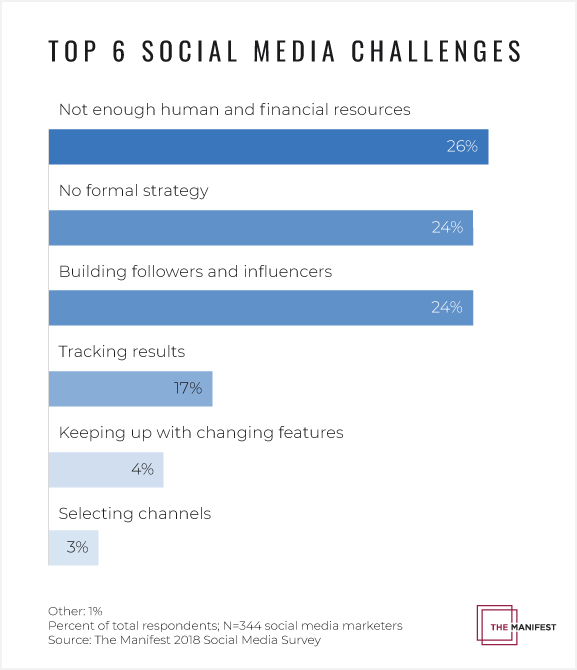How to Choose Social Media Platforms for Your Business

How to Choose Social Media Platforms for Your Business
A guide to choosing social media channels that allow your business to accomplish more in less time.
If you own a small or medium business, chances are you’ve experienced social media burnout at one time.
There’s a lot of pressure to build community, engagements, and leads through social media. If you’re doing it all in-house, trying to keep up with all the to-dos can quickly become overwhelming.
If the above sounds like you, you’re not alone. According to a recent survey from The Manifest and publisher and learning platform Smart Insights, the main social media challenge businesses face is not having enough financial and staff resources.

The good news is that with a bit of planning and prioritizing, you can build a bigger, more engaged social community.
Are you trying to work more than 2 social media channels into your marketing routine?
Unless you have a team of people dedicated to social media, you’ll never master any of the networks by spreading yourself and your staff so thin.
Stop trying to do it all!
Instead, choose only 1 (or 2) social media platforms, and master your approach. This gives you the opportunity to focus on a specific audience and dig deeper into your analytics.
In the end, one successful social media channel can bring more ROI than 5 channels that are stretched thin.
Step 1: Identify the Most Popular Social Channels for Business
If you’re going to focus your social media efforts on only 1 or 2 channels, you want to do it wisely. How will you know which ones to choose?
Let’s start by taking a look at the most popular social channels for business in 2017.
A large part of your decision will depend on whether you’re a B2B or a B2C business. There’s a split between the two when it comes to which channels are most effective.
The Most Popular Social Platform for B2C Businesses is Facebook
If you sell directly to your product or service’s end-user, then you’ll want to reach your audience when they’re in consumer mode.
The Facebook crowd browses with the perfect mindset for B2C customers.
People tend to make more personal purchasing decisions while engaging on Facebook than on its business-minded alternatives like LinkedIn or Twitter, according to Steve Pearson, CEO of social media marketing agency Friendemic.
Here’s a list of the most popular channels for B2C businesses, according to our survey:
- YouTube
B2C Businesses, Don’t Underestimate YouTube or Instagram
If you’re choosing two channels instead of one, the first seems easy (Facebook), but the second will require some thought. Twitter and LinkedIn are great for networking, but to reach consumers directly, you’ll probably want your second social media platform to be YouTube or Instagram.
Don’t underestimate Instagram: Their latest data shows 500 million active daily users and 25 million business accounts.
The Most Popular Social Platform for B2B Businesses is LinkedIn
If your business sells products or services to other businesses, then you might want to consider LinkedIn first.
“Studies show that 80% of B2B leads come from LinkedIn, and 94% of B2B marketers use LinkedIn to distribute content” – "10 Surprising Stats," LinkedIn
Here’s a list of the most popular channels for B2B businesses:
- Twitter, Facebook, YouTube (all nearly tied)
B2B marketers, like their B2C counterparts, should also keep their eye on Instagram. B2B participation in this platform doubled last year: 30% of B2B marketers now include Instagram in their social media efforts.
Step 2: Research Your Audience and Industry
Statistics and data change daily, so you can’t rely solely on what reports say everyone else is doing. This is a great time to refer to your social media strategy and ask yourself the following questions:
- Where are my buyer personas spending their time?
- What are my social media goals? Which channel can help me achieve them?
- Where are my competitors spending their time?
There’s a long list of benefits to all of the social networks. The most common reasons businesses invest time and money in social media are:
- Quality and/or increased lead generation
- Building relationships and community
- Increased website traffic
- Brand awareness
- Customer service
- Better understanding of their audience
How will you measure your social media success? Narrowing your priorities to one goal will also help you save time and be more successful.
Nearly 40% of businesses measure success by social media engagement, and 35% turn toward conversion rates to see what’s working for them.
Which goal will be your top priority?
Step 3: Choose a Platform and Keep Your Eye on the Prize
Once you’ve chosen your social media channel(s), remember to stay laser-focused on your goal of increasing effectiveness and saving time.
How do other businesses do it? More than 40% of them use social media management software to schedule posts ahead of time.

Another 28% of companies hire a social media agency to do the work for them.
Before you consider hiring an agency, though, try to do as much as you can on your own. The better you understand social media’s value and build a base, the better your agency investment will pay off.
What Are Next Steps After Choosing a Social Media Platform?
Don’t get starry-eyed over big numbers. It’s great to have a large following, but keep in mind that it’s the quality (not quantity) of traffic that determines ROI.
Get to know the analytics of the network(s) you’re active on. Study the insights and be sure to track and measure results of the different types of posts and content you share.
Tracking the results of your social media activity is key to determining the best times to post content.
Be steady and reliable. Dependability is important to building a community, so post regularly and respond quickly to customer comments.
By now, you probably have a good idea of what social media channels will work best for your company. Let’s recap how we got here:
- Review the most popular social channels for your type of business
- Research your buyer personas, social media platforms, and competitor social media activity
- Refer to your written social media strategy to be sure your goals and measurements line up with your intentions
- Choose your channels, and move forward steadily
When it comes to social media and marketing, preparation pays off. Narrowing your social media focus to one channel and one goal gives you the chance to become a raving success. You’ll learn more about the network, your audience, and how to achieve your goals along the way.
Ready to time your social media posts to your audience's online behavior, learn the best times to post to Facebook, Instagram, and Twitter.
